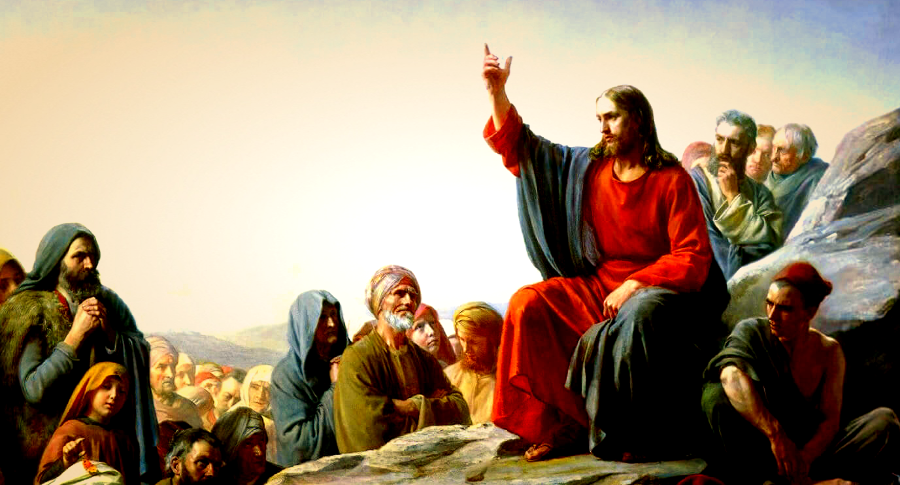Parable of Wedding Banquet/Feast

Parable of the Wedding Banquet/Feast: Matthew 22:2-14
Jesus tells the parable of the wedding banquet, also called the parable of the wedding feast, in order to describe the kingdom of God in light of two parables he has just told.
In the context of Matthew, the religious leaders have just questioned Jesus about his authority, to which Jesus responds with a question and then tells them these two parables:
The religious leaders realize Jesus is talking about them in his parables: they are the disobedient son and wicked tenants.
Jesus then tells them this parable of the wedding banquet, in order to describe the kingdom of heaven in relation to what he has just said in these two previous parables.
Summary of Parable of the Wedding Banquet
Jesus begins the parable of the wedding banquet by saying, "The kingdom of heaven may be compared to a king who gave a wedding banquet for his son." (Matthew 22:2) The king sends out servants to retrieve everyone who has been invited to the wedding banquet. However, all these invited guests essentially say they are too busy with other matters, and some even kill the servants sent to get them.
The king is outraged and he sends soldiers to kill the people who murdered his servants and to burn down their city. The king then says to more of his servants, "The wedding is ready, but those invited were not worthy. Go therefore into the main streets, and invite everyone you find to the wedding banquet." (Matthew 22:8-9)
These servants then go ahead and gather everyone who will come, both good and bad, and the wedding hall is filled with guests. However, the king sees a man who doesn't have a wedding robe on. He says, "'Friend, how did you get in here without a wedding robe?' And he (the man) was speechless. Then the king said to the attendants, 'Bind him hand and foot, and throw him into the outer darkness, where there will be weeping and gnashing of teeth.' For many are called, but few are chosen." (Matthew 22:12-14)
Meaning of Parable of the Wedding Banquet
This parable of the wedding banquet is similar to the Parable of the Great Dinner in Luke 14:16-24, having a similar message, but it is generally considered to be a separate parable due to the differences.
The history between God and Israel is the context for understanding this parable of the wedding banquet. The wedding banquet, and the invitation to it, represents God's invitation into a covenant with him. A wedding is a good comparison to make, because it is the initiation of a covenant between the two getting married.
The king is God. The servants sent out to invite the guests are God's prophets, and the guests who were too busy to come are many of the Israelites. The destruction of the murderers and their city could mean many things, including being a prediction of the destruction of Jerusalem that was to happen in 70 A.D. by the Romans.
Those who are invited from the streets are literally anyone who will accept the invitation to God's covenant.
Man Without a Wedding Robe
Jesus then says that the king sees a man who is in the wedding hall, but he does not have on a wedding robe.
Due to the fact that these people were invited off the streets, it would be unrealistic to expect them to have a wedding robe, which means the robes would have been provided by the king. It is reasonable that a king could provide many wedding guests with robes.
Therefore, if this man had refused to wear a wedding robe, and had come to the wedding hall of a royal wedding without proper attire, it would be an insult. The king's outrage could be expected.
In Revelation 3:4-5 Jesus says, "Yet you
have still a few persons in Sardis who have not soiled their clothes;
they will walk with me, dressed in white, for they are worthy. If you conquer, you will be clothed like
them in white robes, and I will not blot your name out of the book of
life; I will confess your name before my Father and before his angels." In Revelation, Jesus is speaking to believers, telling them to repent of their sins or else they will have their name removed from the book of life.
This man without a wedding robe represents someone who pretends to accept the invitation to God's covenant, but then refuses the invitation with their actions.
Jesus also says, "Remember then what you received and
heard; obey it, and repent. If you do not wake up, I will come like a
thief, and you will not know at what hour I will come to you." (Revelation 3:3)
Many Are Called, But Few Are Chosen
The king then concludes by saying, "For many are called, but few are chosen." (Matthew 22:14)
This statement is similar to what Jesus says in Matthew 7:13-14, "Enter through the narrow gate; for the gate is wide and the road is easy that leads to destruction, and there are many who take it. For the gate is narrow and the road is hard that leads to life, and there are few who find it." Many are called, but few are chosen.
Jesus also says in Matthew 7:21, "Not every one who says to me, 'Lord, Lord,' will enter the kingdom of heaven, but only the one who does the will of my Father in heaven." Many are called, but few are chosen.
In Luke 6:46, Jesus says, "Why do you call me 'Lord, Lord' and do not do what I tell you?" Many are called, but few are chosen.
In John 14:15, Jesus says, "If you love me, you will keep my commandments." Many are called, but few are chosen.
The invitation for salvation is open to everyone, but only those who accept it by repenting and doing the will of God will be allowed to enter the kingdom of heaven. As Paul says, "Do you not realize that God's kindness is meant to lead you to repentance?" (Romans 2:4)
Many are called by God, "For this is my blood of the covenant, which is poured out for many for the forgiveness of sins." (Matthew 26:28) However, only those who take the hard road to life and obey God's commandments are chosen for salvation. Jesus also says, "and whoever does not take up the cross and follow me is not worthy of me." (Matthew 10:38)
It is those who respond, heed, and obey his calling who will be chosen. Few are chosen, because "the gate is narrow and the road is hard that leads to life, and there are few who find it." (Matthew 7:14)
As seen in this parable of the wedding banquet, only the wedding guests who accepted the invitation fully (by both coming AND wearing a wedding robe) were the ones chosen because they fully obeyed.
For more information on this subject, read about the Meaning of Repentance and Salvation.
In addition to this parable of the wedding banquet/feast, there are several other parables that also communicate this idea that our actions show what we truly believe, as well as showing whether or not we accept God's gift of salvation:
God's Truth Taught in Stories
Study the parables of Jesus in this easy-to-read 40 day devotional.
This devotional takes the unique approach of
understanding Jesus' parables by examining the genre, scriptural
context, and historical culture. Your life will be transformed by studying the parables of Jesus Christ.
Go to previous parable: Two Sons
Go to next parable: Ten Bridesmaids (Virgins)
← Back to The Parables of Jesus Christ from Parable of the Wedding Banquet (Parable of the Wedding Feast)
Go to Messiah of God Home
YOU MAY ALSO LIKE
-
God’s Delay Is Not God’s Denial (Ecclesiastes 3:11, Habakkuk 2:3)
Have you ever prayed for something, waited, and felt like God was silent? Have you ever believed for a breakthrough, yet faced delay after delay? Many of us... -
Biology of Cell confirms Intelligent Design: Irreducible Complexity
The complex biology of the ‘basic cell’ exhibits what has been termed ‘irreducible complexity’ by biochemist Michael Behe, due to the fact that removing even... -
What is love? It's a call to action.
What is love? It's a call to action. Guest post by Ben Byrum. -
Miraculous Physical Healing Explains Salvation: The Truth of Jesus’ Salvation
If you have stage 4 pancreatic cancer, then with current medical technology you have likely not been given any hope for getting better. Your cancer is terminal. In fact, with many diseases... -
Does Science Argue For or Against God?
Probability of the Universe Existing in Coin Flips: Flipping a coin has a 50/50 chance of heads vs tails. How many times do you think you could flip heads in a row with a 50/50 chance? -
Man Finds Single Ominous Bible Page in Wildfire Aftermath
Wildfires in Tennessee have temporarily displaced thousands of people fleeing from the destruction. Over 100 homes have been destroyed, as well as hotels and businesses. Thus far, seven people... -
How to Obey God's Will
Obeying God's will is actually more simple than it seems. The truth is that some actions are good (holy), some actions are bad (sinful), and the majority of actions are completely neutral... -
Doubting After God Answers Your Prayers
Having God answer your prayers can result in overwhelming feelings of joy, relief, and thankfulness. However, sometimes doubt of God's intervention can appear and begin to steal your confidence... -
How to Prove God Exists
For unbelievers, there are only a few ways to prove that God exists, depending on how willing they are to accept God's existence. For unbelievers who are... -
The Lie of Sanctification
Sanctification is a widely accepted belief that bridges the gap between the biblical mandate for obedience to God and the practical application of living a Christian life as...





